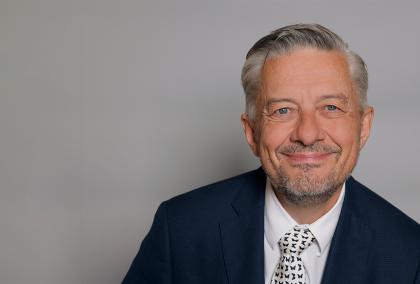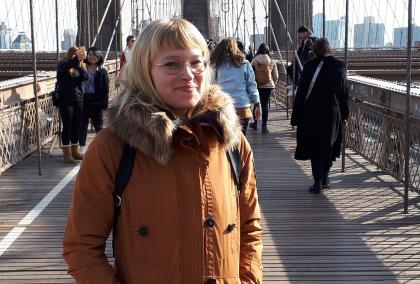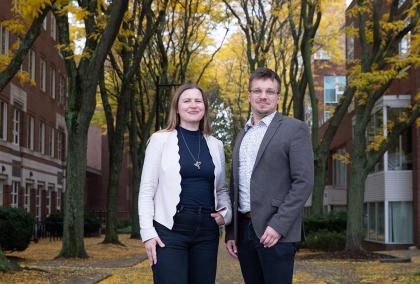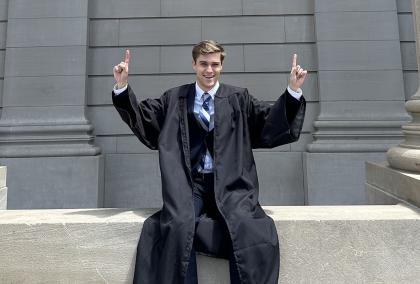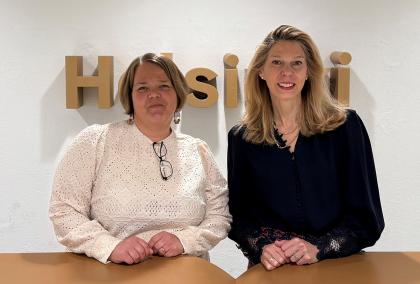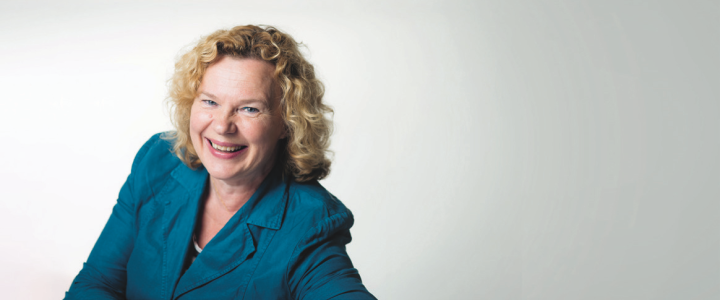

A well-known expert on chemical food safety, Marina Heinonen leads the University of Helsinki’s Department of Food and Nutrition, works as an expert advisor for the European Food Safety Authority, and is frequently interviewed in the Finnish media about food additives and food safety issues. Among her many achievements, she has recently been recognised for her work in science communication, receiving a Sokrates award for scientific communication in 2019, and listed as one of the top 25 business influencers in 2020 by Finnish business newspaper Kauppalehti.
Marina had her first taste of the potential impact of her research on people’s lives as a masters student at the University of Helsinki, where she contributed towards a large study of carotenoids in foods. “We were building up a food composition databank which was used in big lung cancer survey, focusing on beta-carotene, one of the main carotenoids. That was the point that I got really interested in research, and I thought I would like to continue to PhD.”
In 1987, she travelled to the U.S. to begin an ASLA-Fulbright Graduate grant term at the University of Rhode Island, Kingston, working with Professor Kenneth L. Simpson, a pioneer in carotenoid research who Marina describes as a “guru” in the field. At that time, she explains, it was difficult to gain access to research publications on carotenoids. “We didn’t have internet or Google, so they had to be ordered from the library. But in Rhode Island I just walked into my professor’s office, and he had everything.”
“That Fulbright year made a great impact on my scientific career, but it also broadened my understanding of the scientific network and left me with a very good understanding of life in American universities. It was my very first time in the U.S. – I had only been in some of the Nordic countries before that. My husband and I went there with big trunks – we took half of our household with us! It was really an adventure, but we made it! Ten years later, I returned to the U.S. as a postdoc, this time to the University of California, Davis, with my husband and daughter.”
That Fulbright year made a great impact on my scientific career, but it also broadened my understanding of the scientific network and left me with a very good understanding of life in American universities.
From the Lab to the Supermarket
“In my research group, we study the chemical reactions in foods, such as oxidation, or the formation of harmful components due to food processing. We are also working on isolating proteins from different food materials, such as plants, dairy, or insects, and we evaluate how useful these different proteins are in different food matrices. This brings us to the question of sustainability, which is a major focus of our work, in collaboration with others.”
Marina says that although there is no magic ingredient, there are a number of possibilities for more sustainable food production, for example, the use of waste products from agriculture, known as agri-food side streams, as non-animal sources of protein. “We should take advantage of all sorts of different ingredients. For example, with a crop like corn, you only use a fraction of the plant. Why not the leaves? The same is true for root vegetables like potatoes or carrots. Could we also exploit the green part and make that into proteins? And how should we do it? It may be possible to isolate proteins using hot water or fermentation techniques, for example. The green parts of carrots may not be so digestible for humans, but they are for other animals, such as snails and microbes, and we can learn from them in developing new food sources.”
In addition to her academic research and teaching, Marina has for the past 20 years worked as an expert with the European Food Safety Authority. “I’ve worked with them almost since the authority has existed, working on evaluating the safety of so-called novel foods. If you look at the ingredient list of many products in the supermarket, there’s a lot of different ingredients that you might not recognise. Many new ingredients are being developed based on plants, insects, algae, and fungi. Since humans have not been regularly eating these new foods, they all need to be assessed for safety. This involves chemistry, technology, nutrition, and toxicology. It’s really eye-opening, not only understanding different aspects of food safety but also food development.”
Conveying the Message
“I think I’ve always been interested in work where you can really have an influence. In my work there are a lot of areas where I can be of service to the community. I often get to participate at national level, with the ministries, our food authority, different working groups, and also at European level.”
Does she have any advice for younger researchers today wishing to communicate their research to a wider audience? “My advice would be to please be available, and to dare to express your opinion based on the latest science. Very often scientists tend to be a little bit hesitant, but you shouldn’t be. People usually want exact answers, and we can give them, based on scientific findings.”
However, Marina notes that public and media engagement also sometimes requires a thick skin, especially in the age of social media, where negative comments, misunderstandings, and false statements can pose a challenge. “Young researchers need to be educated about this. Not to be scared, but to be prepared about what may happen and what to do.”
Marina had her first experience of being interviewed by the media at her PhD thesis defence in 1990. “Dissertations don’t usually attract that much attention, but at my thesis defence there were more than two hundred people and a lot of media.”
Marina’s research found that the levels of vitamin A in liver products available to consumers were excessively high, posing a risk to certain population groups. “Pregnant women were particularly at risk, and because of that finding even now the recommendations are for pregnant women to avoid eating liver products. The meat industry changed the recipes for the liver-based foods, to reduce the level of vitamin A in their products, and even now when I talk to people from that sector they recognize my name because of this.”
I believe it’s very important to comment in public to convey truthful scientific information, especially in my area of food safety, because there is a lot of misunderstanding.
Although the public attention was a little daunting at first, Marina says the experience was positive, and laid the groundwork for her later science communication activities. “It was good because I ended up being part of national expert groups where we discussed the issue and how to mitigate this risk for certain population groups.”
“I believe it’s very important to comment in public to convey truthful scientific information, especially in my area of food safety, because there is a lot of misunderstanding. Of course, I have the advantage of educating our students, who will mostly go to work for the food industry. But I’ve always believed that conveying the message outside of the university is also part of our work. It’s not only to inform consumers, but also to influence the decision makers.”
